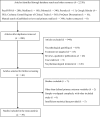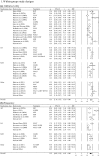Pharmacological Treatments for Disordered Gambling: A Meta-analysis - PubMed (original) (raw)
Review
Pharmacological Treatments for Disordered Gambling: A Meta-analysis
Martina Goslar et al. J Gambl Stud. 2019 Jun.
Abstract
Disordered gambling is a public health concern associated with detrimental consequences for affected individuals and social costs. Currently, opioid antagonists are considered the first-line treatments to reduce symptoms of uncontrolled gambling. Only recently, glutamatergic agents and combined pharmacological and psychological treatments have been examined appearing promising options for the management of gambling disorder. A multilevel literature search yielded 34 studies including open-label and placebo-controlled trials totaling 1340 participants to provide a comprehensive evaluation of the short- and long-term efficacies of pharmacological and combined treatments. Pharmacological treatments were associated with large and medium pre-post reductions in global severity, frequency, and financial loss (Hedges's g: 1.35, 1.22, 0.80, respectively). The controlled effect sizes for the outcome variables were significantly smaller (Hedges's g: 0.41, 0.11, 0.22), but robust for the reduction of global severity at short-term. In general, medication classes yielded comparable effect sizes independent of predictors of treatment outcome. Of the placebo controlled studies, results showed that opioid antagonists and mood stabilizers, particularly the glutamatergic agent topiramate combined with a cognitive intervention and lithium for gamblers with bipolar disorders demonstrated promising results. However, more rigorously designed, large-scale randomized controlled trials with extended placebo lead-in periods are necessary. Moreover, future studies need to monitor concurrent psychosocial treatments, the type of comorbidity, use equivalent measurement tools, include outcome variables according to the Banff, Alberta Consensus, and provide follow-up data in order to broaden the knowledge about the efficacy of pharmacological treatments for this disabling condition.
Keywords: Gambling disorder; Meta-analysis; Pharmacological treatment.
Conflict of interest statement
Conflict of Interest:
Martina Goslar declares that she has no conflict of interest. Max Leibetseder declares that he has no conflict of interest. Hannah M. Muench declares that she has no conflict of interest. Dr. Hofmann receives financial support from the Alexander von Humboldt Foundation (as part of the Humboldt Prize), NIH/NCCIH (R01AT007257), NIH/NIMH (R01MH099021, U01MH108168), and the James S. McDonnell Foundation 21st Century Science Initiative in Understanding Human Cognition – Special Initiative. He receives compensation for his work as editor from Springer Nature and the Association for Psychological Science, and as an advisor from the Palo Alto Health Sciences and for his work as a Subject Matter Expert from John Wiley & Sons, Inc. and SilverCloud Health, Inc. He also receives royalties and payments for his editorial work from various publishers. Anton-Rupert Laireiter declares that he has no conflict of interest.
Ethical Approval
This article does not contain any studies with human participants or animals performed by any of the authors.
Figures
Fig. 1
Flow diagram of the study selection process
Fig. 2
Individual and overal effect sizes for each study design, medication class and outcome at posttreatment AART ask-advise-refer-therapy, ACAMP acamprosate, AD antidepressants, AGOM agomelatine, BUP bupropion, CARB carbamazepine, CBT cognitive-behavioral therapy, CI confidence interval, CIT citalopram, ECO ecopipam, ESC escitalopram, FLUV fluvoxamine, g Hedges`s g; ID imaginal desensitization, LIT lithium, MEM memantine, MI motivational interviewing, MST mood stabilizers, NAC N-acetylcysteine, NALM nalmefene, NALT naltrexone, NEF nefazodone, OA opioid antagonists, OLAN olanzapine, PARO paroxetine, RW relative weight, SER sertraline, SUPP psychosocial support, TOLC tolcapone, TOP topiramate, VAL valproate. aData for “other medications” were not available
Fig. 2
Individual and overal effect sizes for each study design, medication class and outcome at posttreatment AART ask-advise-refer-therapy, ACAMP acamprosate, AD antidepressants, AGOM agomelatine, BUP bupropion, CARB carbamazepine, CBT cognitive-behavioral therapy, CI confidence interval, CIT citalopram, ECO ecopipam, ESC escitalopram, FLUV fluvoxamine, g Hedges`s g; ID imaginal desensitization, LIT lithium, MEM memantine, MI motivational interviewing, MST mood stabilizers, NAC N-acetylcysteine, NALM nalmefene, NALT naltrexone, NEF nefazodone, OA opioid antagonists, OLAN olanzapine, PARO paroxetine, RW relative weight, SER sertraline, SUPP psychosocial support, TOLC tolcapone, TOP topiramate, VAL valproate. aData for “other medications” were not available
Fig. 2
Individual and overal effect sizes for each study design, medication class and outcome at posttreatment AART ask-advise-refer-therapy, ACAMP acamprosate, AD antidepressants, AGOM agomelatine, BUP bupropion, CARB carbamazepine, CBT cognitive-behavioral therapy, CI confidence interval, CIT citalopram, ECO ecopipam, ESC escitalopram, FLUV fluvoxamine, g Hedges`s g; ID imaginal desensitization, LIT lithium, MEM memantine, MI motivational interviewing, MST mood stabilizers, NAC N-acetylcysteine, NALM nalmefene, NALT naltrexone, NEF nefazodone, OA opioid antagonists, OLAN olanzapine, PARO paroxetine, RW relative weight, SER sertraline, SUPP psychosocial support, TOLC tolcapone, TOP topiramate, VAL valproate. aData for “other medications” were not available
Similar articles
- Treatments for internet addiction, sex addiction and compulsive buying: A meta-analysis.
Goslar M, Leibetseder M, Muench HM, Hofmann SG, Laireiter AR. Goslar M, et al. J Behav Addict. 2020 Apr 1;9(1):14-43. doi: 10.1556/2006.2020.00005. J Behav Addict. 2020. PMID: 32359229 Free PMC article. - Pharmacological treatments in pathological gambling.
Grant JE, Odlaug BL, Schreiber LR. Grant JE, et al. Br J Clin Pharmacol. 2014 Feb;77(2):375-81. doi: 10.1111/j.1365-2125.2012.04457.x. Br J Clin Pharmacol. 2014. PMID: 22979951 Free PMC article. Review. - Pharmacological treatments of pathological gambling.
Hollander E, Sood E, Pallanti S, Baldini-Rossi N, Baker B. Hollander E, et al. J Gambl Stud. 2005 Spring;21(1):99-110. doi: 10.1007/s10899-004-1932-8. J Gambl Stud. 2005. PMID: 15789195 Review. - Efficacy of face-to-face versus self-guided treatments for disordered gambling: A meta-analysis.
Goslar M, Leibetseder M, Muench HM, Hofmann SG, Laireiter AR. Goslar M, et al. J Behav Addict. 2017 Jun 1;6(2):142-162. doi: 10.1556/2006.6.2017.034. J Behav Addict. 2017. PMID: 28662618 Free PMC article. - Does sustained-release lithium reduce impulsive gambling and affective instability versus placebo in pathological gamblers with bipolar spectrum disorders?
Hollander E, Pallanti S, Allen A, Sood E, Baldini Rossi N. Hollander E, et al. Am J Psychiatry. 2005 Jan;162(1):137-45. doi: 10.1176/appi.ajp.162.1.137. Am J Psychiatry. 2005. PMID: 15625212 Clinical Trial.
Cited by
- Associations Between Addictive Behaviors, Individual Characteristics, and the Use of Gambling Services Within the World of Gaming: Cross-sectional Survey Study.
Kisch M, Håkansson A. Kisch M, et al. JMIR Serious Games. 2022 Apr 22;10(2):e29077. doi: 10.2196/29077. JMIR Serious Games. 2022. PMID: 35451974 Free PMC article. - The Effects of Responsible Gambling Pop-Up Messages on Gambling Behaviors and Cognitions: A Systematic Review and Meta-Analysis.
Bjørseth B, Simensen JO, Bjørnethun A, Griffiths MD, Erevik EK, Leino T, Pallesen S. Bjørseth B, et al. Front Psychiatry. 2021 Jan 25;11:601800. doi: 10.3389/fpsyt.2020.601800. eCollection 2020. Front Psychiatry. 2021. PMID: 33569015 Free PMC article. - Sleepwalking, sleep-related eating disorder and sleep-related smoking successfully treated with topiramate: a case report.
Kazi SE, Mohammed JMM, Schenck CH. Kazi SE, et al. Sleep Sci. 2022 Jul-Sep;15(3):370-373. doi: 10.5935/1984-0063.20220065. Sleep Sci. 2022. PMID: 36158718 Free PMC article. - Treatments for internet addiction, sex addiction and compulsive buying: A meta-analysis.
Goslar M, Leibetseder M, Muench HM, Hofmann SG, Laireiter AR. Goslar M, et al. J Behav Addict. 2020 Apr 1;9(1):14-43. doi: 10.1556/2006.2020.00005. J Behav Addict. 2020. PMID: 32359229 Free PMC article. - Gender Differences in Problem Gamblers in an Online Gambling Setting.
Håkansson A, Widinghoff C. Håkansson A, et al. Psychol Res Behav Manag. 2020 Aug 18;13:681-691. doi: 10.2147/PRBM.S248540. eCollection 2020. Psychol Res Behav Manag. 2020. PMID: 32884371 Free PMC article.
References
- American Psychiatric Association . Diagnostic and statistical manual of mental disorders. 5. Washington, DC: Author; 2013.
- Bartley CA, Bloch MH. Meta-analysis: Pharmacological treatment of pathological gambling. Expert Review of Neurotherapeutics. 2013 - PubMed
- Berlin HA, Braun A, Simeon D, Koran LM, Potenza MN, McElroy SL, Fong T, Pallanti S, Hollander E. A double-blind, placebo-controlled trial of topiramate for pathological gambling. World Journal of Biological Psychiatry. 2013 - PubMed
- Black DW. An open-label trial of bupropion in the treatment of pathologic gambling. Journal of Clinical Psychopharmacology. 2004 - PubMed
- Black DW, Arndt S, Coryell WH, Argo T, Forbush KT, Shaw MC, Perry P, Allen J. Bupropion in the treatment of pathological gambling: A randomized, double-blind, placebo-controlled, flexible-dose study. Journal of Clinical Psychopharmacology. 2007 - PubMed
Publication types
MeSH terms
LinkOut - more resources
Full Text Sources
Medical

